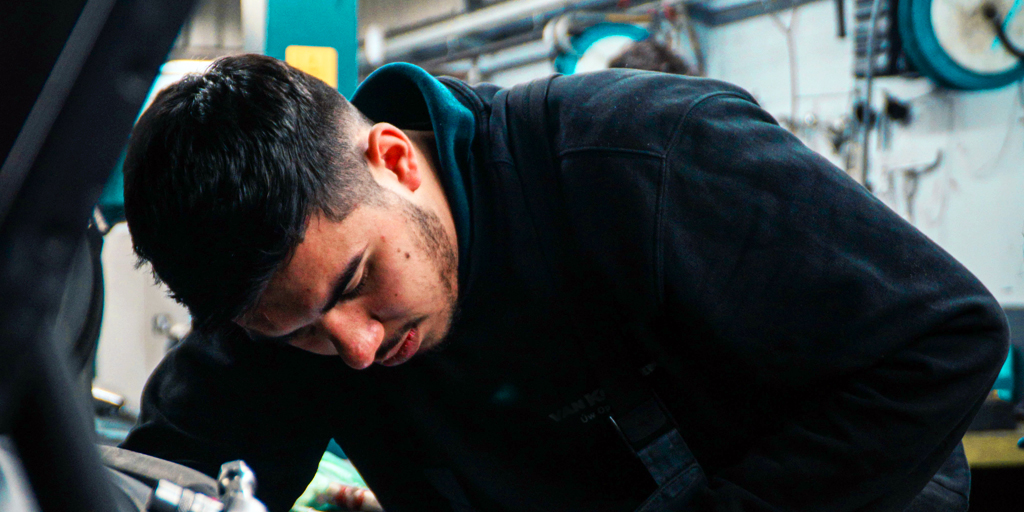Mechanic careers guide & job description
If you're good with your hands and you've got a practical knack for making things work, mechanic careers could 100% be your thing.
Mechanic Careers: What's Involved
Getting Into Mechanic Careers
Similar jobs: Motor vehicle technician, service technician, construction plant mechanic
“Mech” is from the ancient Greek for “machine”. It just goes to show how long people have been working with machines. Mechanics will be working on tourist space flights as machine technology improves. As a mechanic, it’s your job to master the insides of machines, usually in the form of equipment or vehicles.
What Types Of Mechanic Can You Be?
- Vehicle mechanic (also called a car mechanic, motor vehicle technician or service technician)
- Construction plant mechanic
So what appeals to you most? Vehicles and engines, from cars to aircraft and Formula 1 extravaganzas? Or working with a wide variety of equipment, from generators to demolition equipment? Your choice will guide you to which kind of mechanic you’d most want to be.
Busting myths about mechanic careers
Sam, a level 3 apprentice at the JCB college, says: “I was under the misconception that it’s a dirty job, you don’t get paid much and the education is low but I’d say I do the same level as people doing A-levels are doing.”
Find out more about his journey as a mechanic apprentice in this Department for Education video:
How Much Money Can You Earn As a Mechanic?
These LMI Job Trends give you a sneak peek of how much you could earn starting out for this career, and how much your salary could grow with experience.
Average Salary For Mechanic Jobs
Recent labour market information says you can earn on average between £12,000 and £35,000 a year as a mechanic (either working with vehicles or construction plant equipment) in the UK.
Your starting salary can vary because of factors like level of experience, training, or location. Your salary as a mechanic will increase over time as you build skills, knowledge and experience.
Skills You Need To Become A Mechanic
Useful Skills To Put On Your CV:
- Customer service skills – you’ll need to talk about any repairs which might be needed, how long they’ll take to do, and how much they’ll cost
- Good practical and problem-solving skills – every vehicle fault is a problem, and you’ll be using your brain and hands to fix them!
- Being able to follow both spoken and written instructions to carry out servicing and maintenance in the way that’s been asked of you
- Being able to pick up new car and vehicle tech trends – every year, cars are brought out to be better than the year before. One day you might be working on a vintage Jaguar like James Bond might drive, and the next you might be asked to work on an electric or hybrid car. Being able to think sideways with what you already know and apply it to new situations is a big plus.
Useful skills for construction plant mechanic jobs:
- Great mechanical maintenance skills – if you love working with your hands, this could be the job for you
- Good problem solving skills
- Self-management skills and being able to work alone without a supervisor always being there to tell you what to do.
How Do You Get These Skills?
Vocational qualifications and work experience will help you build these skills over time.
Build Your Skills With the FREE Young Professional ProgrammeWhat Qualifications & Training Do You Need For Mechanic Careers?
School, College And Training
Although you don’t need formal qualifications to become a mechanic, a lot of mechanics start off with an apprenticeship or some form of structured training, either full-time or while on the job.
You may find it easier to get work as a mechanic with a big employer if you can show you have a strong basic foundation in English and numbers, so around four GCSEs in grades 9-4 (A*-C) will help your progression.
A number of training schemes are available. You can begin your training from the age of fourteen, as the Institute of Motor Industry (IMI) offers a pre-apprenticeship programme to students aged 14-16.
Colleges and private training providers offer a range of courses which you can do on day release while working, or you can take a college full-time course which offers practical training as well as classroom study, and can organise work experience placements.
Example college courses include Plant and Vehicle Maintenance, but you can find a range of mechanic courses via providers like the National Construction College (NCC) and more. For example, the NCC offers a two-year plant mechanics course leading to a qualification in Plant Maintenance at level 2 or 3.
Mechanic Apprenticeships
With a mechanic-related apprenticeship (or advanced apprenticeship) you’ll have a paid job with an employer that includes structured training and learning. This training leads to an official qualification that’s recognised by employers as an industry standard.
Lots of manufacturers and companies in plant hire or construction offer mechanic and maintenance apprenticeships where you can train at a centre, or study at a college or training provider on day or block release while you do paid work with that employer. These apprenticeships typically last three to four years, and lead to an qualification in Plant Maintenance (Construction) at level 2 or 3.
You can seek out mechanic-related apprenticeships with organisations like Find an Apprenticeship.
These Employers & Training Providers Offer Mechanic Apprenticeships
Total People Skillcert Remit TrainingMechanic Career Path And Progression
If you start off as a vehicle mechanic, with time and experience you can become a senior mechanic technician, garage manager or workshop supervisor.
You could also set up your own vehicle and/or equipment maintenance and servicing business.
You could also specialise in areas like motorsport engineering to work on high-performance Formula 1 cars, or you could work as an MOT tester or breakdown engineer. You could even specialise in certain types of vehicles, like hybrid or electric cars.
What Work Experience Do You Need For Mechanic Jobs?
Work Experience Tips
To become a vehicle or plant mechanic it will help you to have previous experience of working with equipment and/or vehicles. This will help you demonstrate to employers that you have a genuine interest in being a mechanic and are motivated to do your job.
Aim to get relevant work experience to build your CV as early as you can. This can involve:
- Jobs, work experience or placements in anywhere from a garage to a construction plant (if you take a college course they will often arrange work placements for you)
- If your home has a car or vehicle, take an active interest and help out with repairs maintenance. That doesn’t mean just washing the car, that’s the easy bit! Learn how the breaks, steering and clutch work. Whenever you get the chance, assist with blowing up tyres or going under the bonnet when things go wrong. Car maintenance is a great skill to have because it could save you money when you get your own car. It’s also the perfect skill to pick up if you want a mechanic job. It could also help you discover if you have an interest in mechanical engineering in general.
Volunteering Tips
Look for volunteering opportunities where you can service cars and equipment, if you’re allowed to, or work with your hands.
Volunteer with projects where you can explore your technical and practical skills, especially in the world of engineering and manufacturing.
Extra-curricular activities
Did you love playing with LEGO when you were younger? Any hobby or interest that involves putting things together to make them work is a very good way to build up skills that involve solving problems with your hands.
If anyone you know buys flat-pack furniture, don’t leave them cursing because they set it up wrong. Offer to help, and get that coffee table looking exactly how it does in the picture.
What Does A Mechanic Do?
Example vehicle mechanic daily job responsibilities
- Checking vehicles to see where the problem lies, often using digital diagnostic equipment
- Customer service – explaining the cost of repairs, what repairs are needed or if they’re urgent, and how much time they’ll take with customers
- Carrying out general servicing, repairs and maintenance on cars and other vehicles
- Road testing vehicles to check the repairs have done the job
- Fitting accessories like alarms and stereos
- Keeping records, checking stock levels and ordering parts
Example plant mechanic daily job responsibilities
- Repairing and servicing plant equipment including cranes, dozers and a whole lot more
- Carrying out regular inspections on areas most likely to have a fault like gearboxes, hydraulics, electrics, and engines
- Using hand and power tools and specialist equipment to repair or replace any parts that are faulty
Because the work you do can be so varied, you are likely to build up a good working knowledge of all kinds of different areas of vehicle/plant maintenance.
You’re likely to build up skills working with electronics as well as mechanics. That’s why you could also find these skills useful if you choose to move into mechanical or electrical engineering, perhaps starting your journey as an engineering maintenance technician.
How To Find Mechanic Jobs: Next Steps
To find jobs for young people in this role, search on jobs boards for early career roles with these words in the title:
- Vehicle technician
- Motor repair garage mechanic
- Vehicle mechanic
- Mechanic technician
- Plant mechanic
- Plant fitter mechanic
These Youth Friendly Employers Offer Great Opportunities
These Youth-Friendly Employers might be able to help you get great fantastic mechanic jobs, training or experience! Take a look.






































































Logistics Career Tips & Opportunities
Transport and Logistics Career Guides
View job descriptions with average UK salary, useful qualifications and a variety of routes into this career.
Resources And Links
Find an Apprenticeship CILTUK NOVUS Road To Logistics Business On The Move Talent In Logistics iCould- Find an Apprenticeship
- Tomorrow’s Engineers
- Women into Science, Engineering and Construction (WISE)
- Autocity – info about careers in the motor industry
- SEMTA (includes info on engineering and manufacturing apprenticeships)
Engineering Career Tips & Opportunities

Field Engineering Apprenticeship with Coca-Cola Europacific Partners – Reading, High Wycombe & Slough #CreateYourFuture

Field Engineering Apprenticeship with Coca-Cola Europacific Partners – Romford, Ilford & Chingford #CreateYourFuture

Field Engineering Apprenticeship with Coca-Cola Europacific Partners – Taunton, Honiton & Yeovil #CreateYourFuture
Engineering & Manufacturing Career Guides
View job descriptions with average UK salary, useful qualifications and a variety of routes into this career.
YES! I Want More Free Careers Help...
So what are you waiting for? Grab your future.











































